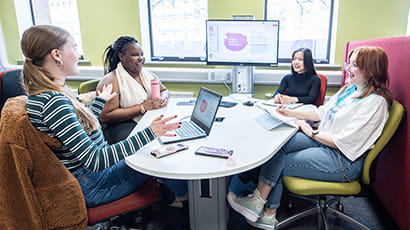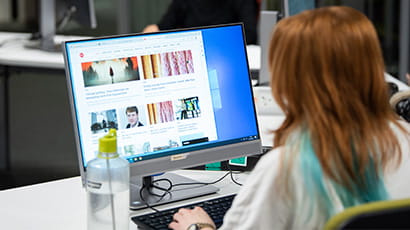Online learning
Advice and guidance on how to make the most of studying online.
Familiarise yourself with key technology
Throughout the academic year you will engage with your studies via a variety of digital technologies. It’s important you take some time to familiarise yourself with these technologies to ensure you feel confident using them.
Adobe Express
UWE Bristol is a Creative Campus giving students free access to Adobe Express. Whether you're new to creative tools, or an aspiring designer, a budding filmmaker, an enterprising entrepreneur, Adobe Express is your gateway to a universe of possibilities.
AppsAnywhere
AppsAnywhere is a web-based app store enabling you to download and run software applications with a single click from any Windows PC on or off campus.
Blackboard
Blackboard is our Virtual Learning Environment. This is where you will find course information. Staff may upload lecture notes and course material to Blackboard. At times online assessments occur via Blackboard.
Access Blackboard through the link in MYUWE.
Microsoft Teams
Microsoft Teams is a teamwork hub and collaboration tool in Office 365 which allows you to work on group projects, discuss ideas or collaborate on files. Your course may use Microsoft Teams for teaching and learning.
Panopto
You can use Panopto to access recorded lectures and media files. You may also be asked to make video assessments.
PebblePad
You may be asked to create and submit work using the PebblePad platform. This might take the form of a reflective portfolio or other online assessment.
Participating in virtual sessions
A virtual session can be an online presentation, lecture, workshop, seminar or group work activity. These will normally take place through Microsoft Teams.
How to prepare for a webinar
- Make sure you have completed the pre-reading for the session.
- Find a quiet location to join your webinar.
- Familiarise yourself with Microsoft Teams.
- It can take a while to connect to an online session, so give yourself plenty of time.
What to do during a webinar
- Listen to how the session host intends to manage the session as this will let you know how interactive it will be and whether it will be recorded.
- Use the text chat to interact with others and engage in real time discussions when prompted.
- ‘Raise your hand’ if you have something you want to discuss or if you want to get the attention of others.
- Mute your microphone when joining sessions and if you aren't going to speak for long periods of time.
- Think about turning your video off if you are having connection and bandwidth problems.
Learning from recordings
As well as webinar recordings you will also have access to other forms of recorded content via platforms such as the thousands of LinkedIn Learning video courses and Box of Broadcasts television programmes. These can take the form of videos and slides and downloadable content. The Library also has an extensive collection of films, documentaries, recorded theatre, and TV programmes, which can be watched online or borrowed free of charge. During your studies you might be asked to review one of these recordings or you might use it to support a particular assignment or project.
We recommend you review your recording in a quiet location and ideally on a laptop, as this will allow you to concentrate and take notes if needed. Read our guidance on making effective notes.
Using e-books
You have access to thousands of e-books and other online reading material, on a variety of platforms through the UWE Bristol Library. These platforms offer a range of features to make e-books more accessible for disabled readers. We have some e-book accessibility guidance outlining which features are available and how to use them.
Alternative formats and assistive technology
When content is added to Blackboard, a tool called Blackboard Ally automatically provides it in an alternative format that suits you, from braille to audio. Here is some guidance on getting a learning resource in a different format.
UWE Bristol students with a print disability can also use our online file conversion tool to change documents into alternative formats. Find out how to create your own alternative format online.
We also have a variety of assistive technology to help support your studies.
Where possible, our Digital Learning Environment (DLE) will meet the accessibility standards outlined in the W3C’s Web Content Accessibility Guidelines 2.1.
Time management
When studying at home it can be more difficult to manage your time effectively. Time management is all about prioritising your tasks to make sure you achieve them in the time you have.
Read our guidance on time management and try out our assignment planner to set some objectives. And why not read Chloe’s blog on how to organise your work and study at home.
Online communication
Staying connected is important, not only to keep up with your studies but to avoid feeling lonely or isolated. If you are finding things difficult then please contact UWE Bristol health and wellbeing services.
Working with others and collaborating on projects is an important part of study and integral to your time as a student. And although online communication can present some challenges, it does have its benefits as well.
Ways to engage with others online
- Participate in webinar and respond to a comment or discussion.
- Form an online study group.
- Join in with virtual writing sprints such as @shutupwrite.
- Have a one-to-one with your tutor using Microsoft Teams.
Synchronous and asynchronous communication
You may have heard the terms synchronous and asynchronous being used to describe different types of online teaching materials and forms of communication.
- Synchronous communication: this takes place in real-time in the present. You may be talking with others through various tools such as Microsoft Teams or taking part in a webinar via Blackboard Collaborate.
- Asynchronous communication: This occurs when people communicate with each other at different times. You may be talking with others or taking part in a webinar through Microsoft Teams.
Netiquette
Netiquette is the common name for the rules for acceptable online behaviour. Many of the same social rules that we would uphold in a classroom environment apply online such as, being respectful of others. Some rules however are particular to digital communication such as:
- Think before you write. Anything you post is likely to remain online forever.
- Avoid CAPS. Typing in capital letters is often associated with shouting and may give the impression that you are angry in an online conversation. It can also be difficult to read.
- Think about how much information you put in a post. You may not want to overload it with multiple points that are difficult to respond to.
- Use the 'raise your hand' function in Teams to signal that you have something you would like to say verbally.
- Ask open-ended questions to tease out more information and keep the conversation going as it might not flow as freely online.
Working with others
You might be asked to work with others on a group project or assignment, such as a presentation. As with any group project, it’s important to listen to each member of the group and establish the roles and tasks taken on by each member. Read our guidance on working with others.
You can use Microsoft Teams and Office 365 to manage your shared activity online, including holding online meetings, and using channels, chat, shared folders and files to organise and discuss your work.
Guidance is available on best practices for collaborating with Office 365 and using Microsoft Teams.
Online assessments and exams
How to submit material for assessment in a variety of digital formats and how to prepare to complete exams at home.
You may also be interested in

Using Microsoft Teams
Microsoft Teams is a teamwork hub and collaboration tool in Office 365 which allows you to work on group projects, discuss ideas or collaborate on files.

How to give a presentation
Advice on preparing presentations and working on group projects.

Research skills
Online advice and tutorials to help you develop your research skills.

Getting started with IT
Our quick help guide for getting started with IT.
